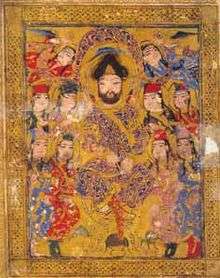Abu al-Faraj al-Isfahani
| Abu al-Faraj al-Isfahani | |
|---|---|
 Illustration from Kitab al-aghani (Book of Songs), 1216-20, by Abu al-Faraj al-Isfahani, a collection of songs by famous musicians and Arab poets. | |
| Native name | أبو الفرج الأصفهاني |
| Born |
897 Isfahan |
| Died |
967 (aged 69–70) Baghdad |
| Known for | Book of Songs |
| Scientific career | |
| Fields | History |
| Patrons | Sayf ad-Dawlah |
`Ali ibn al-Husayn ul-Iṣfahānī (Arabic: أبو الفرج الأصفهاني), also known as Abu-l-Faraj or, in the West, as Abulfaraj (897–967 CE) was an historian of Arab-Quraysh origin[1][2] who is noted for collecting and preserving ancient Arabic lyrics and poems in his major work, the Kitāb al-Aghānī. [3]
Biography
Abu al-Faraj al-Iṣfahānī was born in Isfahan, but spent his youth and made his early studies in Baghdad. He was a direct descendant of the last of the Umayyad caliphs, Marwan II, and was thus connected with the Umayyad rulers in al-Andalus, and seems to have kept up a correspondence with them and to have sent them some of his works. He became famous for his knowledge of early Arabian antiquities.[4]
His later life was spent in various parts of the Islamic world, in Aleppo with its Hamdanid governor Sayf ad-Dawlah (to whom he dedicated the Book of Songs), in Ray with the Buwayhid vizier Ibn 'Abbad, and elsewhere.
Although he wrote poetry, also an anthology of verses on the monasteries of Mesopotamia and Egypt, and a genealogical work, his fame rests upon his Book of Songs (Kitab al-Aghani).[4]
Book of Songs
Kitab al-Aghani (Book of Songs), a twenty volumes work that relates the stories of composers, poets, and singers (both men and women), along with some of their anecdotes, from the oldest epoch of Arabic literature down to the 9th century.[5][6] These stories are related through isnad channels.[5] The poems were put to music, but the musical signs are no longer readable. Because of the accompanying biographical annotations on the authors and composers, the work is an important historical source. It contains a mass of information as to the life and customs of the early Arabs, and is the most valuable authority we have for their pre-Islamic and early Islamic days.[4]
See also
References
- ↑ M. Nallino (1960). "Abu 'l-Faradj al-Isbahani". In Gibb, H. A. R.; Kramers, J. H.; Lévi-Provençal, E.; Schacht, J.; Lewis, B.; Pellat, Ch. The Encyclopaedia of Islam, New Edition, Volume I: A–B. Leiden: E. J. Brill. p. 118. ISBN 90-04-08114-3.
- ↑ Bagley, F. R. C. "ABU'L-FARAJ EṢFAHĀNĪ". Encyclopaedia Iranica. Retrieved 2 April 2017.
- ↑ Sawa, S.G. (1985), "The Status and Roles of the Secular Musicians in the Kitāb al-Aghānī (Book of Songs) of Abu al-Faraj al-Iṣbahānī", Asian Music, Asian Music, Vol. 17, No. 1, 17 (1): 68–82, doi:10.2307/833741, JSTOR 833741
- 1 2 3

- 1 2 Muhammad Mustafa Al-A'zami (2003), The History of The Qur'anic Text: From Revelation to Compilation: A Comparative Study with the Old and New Testaments, p. 192. UK Islamic Academy. ISBN 978-1872531656.
- ↑ Chambers Biographical Dictionary, ISBN 0-550-18022-2, page 5